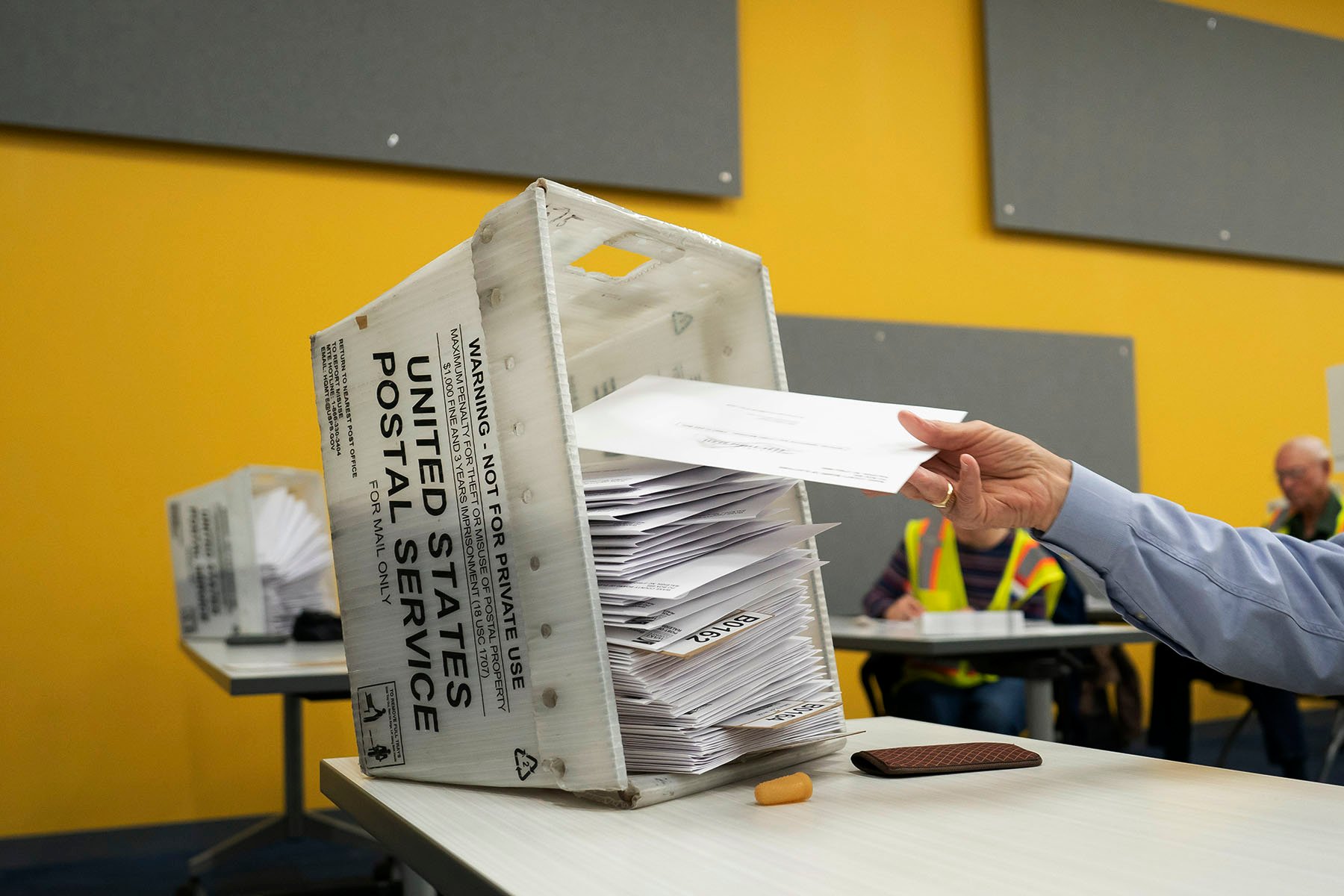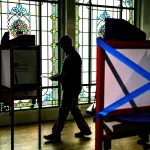The 19th is committed to covering the unfinished business of voting rights. Read more about how we’re approaching that in this pivotal election.
For several weeks, Jamie Boyle of Virginia has been checking to see if the ballots she and her husband mailed on October 4 to an elections office in Pennsylvania have been processed. As of late October, she’s still waiting.
Now Boyle, whose husband serves in the Army, is worried about a series of lawsuits filed by Republicans, including the Republican National Committee, that questions the voting rights of some military families. Among the states ensnared in a lawsuit is Pennsylvania.
“In a situation that is already complicated — is my ballot going to get there in time? — now it’s, is my ballot going to get counted?” she said.
The lawsuits challenge the legitimacy of some ballots cast under the U.S. Uniformed and Overseas Citizens Absentee Voting Act, or UOCAVA. The federal law, which was enacted during Ronald Reagan’s presidency and has long had bipartisan support, covers U.S. citizens living abroad, including voters serving in the U.S. military and their families.
If successful, the lawsuits could impact results in a handful of battleground states with razor-thin voting margins that will determine the outcome of the presidential election. They also spotlight the growing scope of disinformation ahead of November 5.
Some military spouses, 92 percent of whom are women, are expressing frustration at the lawsuits — also filed in Michigan and North Carolina — and what message they send to a population that is already dramatically less likely to vote compared to the general voting public, the reasons for which are layered.
“It’s pretty appalling that partisan operatives have kind of taken direct aim at military voters,” said Kate Marsh Lord, co-founder and communications director for Secure Families Initiative, a nonpartisan organization that works to mobilize military families to vote. The group has highlighted the general barriers that military families face in accessing the ballot.
Boyle and her husband vote under UOCAVA, which ensures the couple can identify Pennsylvania as their home of record. They vote under a Pennsylvania address and pay related taxes there, even as they’ve moved several times over the years for the Army and are currently based in the mid-Atlantic. This practice is common for military families under the Military Spouses Residency Relief Act, since the frequent permanent changes of station (also commonly known as a “PCS”) would otherwise — and often still — require an insurmountable amount of professional strain for the spouse, legal and financial navigation, and general stress for any active duty family.
The lawsuits risk adding more confusion to the behind-the-scenes labor of military spouses who organize their families’ needs.
“We are responsible for an incredibly disproportionate amount of the heavy lifting and the work that comes with running a house,” said Marsh Lord, who currently resides in Virginia with her three children and her husband, who serves in the Air Force. “When you add to that a news alert that your vote might be caught up in a lawsuit about military and overseas voters, it’s a slap in the face … we are literally running ourselves ragged and trying to support our family and support our loved ones.”
There were 168,571 active duty service members stationed abroad as of September 2023, according to the nonprofit and nonpartisan website USAFacts.org. This translates to nearly 76,000 ballots from the woman-identifying military spouse population alone. For context, President Joe Biden won the state of Pennsylvania in the 2020 election by only 80,555 votes.
Mia Dimson, a military spouse voting in the swing state of Arizona from her family’s current station in Germany, has yet to receive her ballot. This is the second time she has faced barriers to participating in the state’s election process remotely. The first, while she was an out-of-state college student in 2022, ended in Dimson not receiving her voting materials until it was too late for her to submit her vote.
“I got phone calls as confirmation that I would be able to vote,” Dimson said, “yet didn’t receive any ballot or proof of being registered to vote in my county until well after the election.”
She is currently facing the second instance of a near-identical scenario. With only weeks until Nov. 5, Dimson is still awaiting her ballot. “I worry that it might not make it back to the states to be counted in time, and I think it’s ridiculous that some states’ GOPs have been proposing that overseas ballots be set aside.”
Veterans are more likely to vote Republican, but recent polling suggests there may be shifts in the younger demographic with prior service. The group Democrats Abroad used the nonpartisan voter support tool Vote From Abroad to report that, among all users (not limited to military or veteran voters), 75 percent declared as Democrats and more than 58 percent were female. Approximately 45 percent of voters were 39 or younger, which is relevant as voters 49 years old or younger are more likely to vote Democrat.
Women are also more likely to vote for Democratic candidates, according to the Center for American Women and Politics, and men, who make up more than 80 percent of active duty service members, are conversely more likely to lean Republican.
Judges this week dismissed lawsuits filed in Michigan and North Carolina. A ruling is still pending for the lawsuit filed in Pennsylvania.
The Republican National Committee and others named as plaintiffs in the lawsuits challenged UOCAVA voters in Michigan and North Carolina who have never lived there but whose parents claimed residency there. The Michigan lawsuit also challenged the rights of spouses under those circumstances.
In the Michigan lawsuit, a judge ruled it was filed too close to Election Day and called it an “11th hour attempt to disenfranchise” voters in the general election. In North Carolina, a judge called the lawsuit’s claims “unsupported and speculative.”
The lawsuit in Pennsylvania, which was filed by six Republican members of Congress about a set of voter ID laws that went into effect in September 2022 and had no issues at the time, claims that the identity or eligibility of overseas voters cannot be verified and should be set aside until such verification is possible.
U.S. Rep. Dan Meuser, one of the plaintiffs in the Pennsylvania lawsuit, attempted to defend his involvement during a CNN appearance by claiming falsely that rules for overseas voting had been changed recently. Anchor Brianna Keilar, whose husband recently retired from the Army, fact-checked Meuser during the interview.
Susan Dzieduszycka-Suinat is president and CEO of the U.S. Vote Foundation, which helps overseas citizens access information to vote. She called efforts to set aside any overseas ballots “a complete disenfranchisement of U.S. citizens.” She described the voting processes for this population as secure.
“The issue here is not really the numbers,” Dzieduszycka-Suinat said during a recent call with reporters. “It’s the overall message it sends that your ballot doesn’t count, and that is hard to overcome. It’s the biggest voter suppression tactic ever.”
Are you unsure of your ballot’s status as election deadlines loom?
Use this tool from the U.S. Vote Foundation to find it, contact your local election office or flag a ballot as being stuck in customs.
Former President Donald Trump, who tried to overturn the 2020 election and shared conspiracy theories about his loss that led to a deadly attack at the U.S. Capitol, claimed without proof on social media this fall that overseas voting could include fraud this election. His allies, including Elon Musk, owner of the social media platform X, then spread the disinformation.
Kathy Boockvar, an elections expert and the former Pennsylvania secretary of state during the 2020 election, noted that the rules for military overseas voting have been in place for years. She questioned the timing of the legal challenges and said it was part of an effort to discredit the elections process and fuel conspiracy theories that set the stage for legal challenges.
“When people think of election subversion, they think of this sort of overt means of election subversion. Like the fake electors scheme or efforts to change the election rules at the last minute or things that are kind of obvious ways to change the results of an election,” she said. “But in many ways, it’s the quietly subversive actions that are the most insidious forms of election subversion.”
Boyle worries about how false information could still spread about military voting. The 43-year-old has seen more news headlines about the lawsuits’ allegations than ones about them being dismissed.
“The damage has been done,” she said. “There are people who are now going to believe that our elections are less safe than they thought they were,” she said.
Secure Families Initiative is tracking the lawsuits and has filed several related amicus briefs.
“It’s really disappointing and it’s depressing that military ballots have been used in this way to sow distrust in our elections when we should be the shining example of rejecting division and fear,” Marsh Lord said. “Our elections work. These systems have been in place for a really long time, including this process that governs how military and overseas voters vote. So we trust the process, and we just want to participate in the democracy that our loved ones serve and defend.”
Marsh Lord, who has previously voted under UOCAVA while living in Germany and Japan, is voting locally this year where she and her husband reside. The 47-year-old called the process “refreshingly easy.” She voted on the first day of early voting.
Boyle, who has occasionally volunteered her time to support Secure Families Initiative, said she made sure her husband requested his ballot on time and mailed it. And while her husband has checked periodically on the status of their ballots, she’s mostly kept on top of calling elections officials and other assistance staff to figure out the next steps.
“The emotional labor and all of the things that we identify that women in society are largely held responsible for disproportionately — the military often exacerbates,” she said.
During the primary, Boyle also made sure the couple turned in their ballots. Her husband’s ballot got in on time. Boyle’s did not.
To check your voter registration status or to get more information about registering to vote, text 19thnews to 26797.




